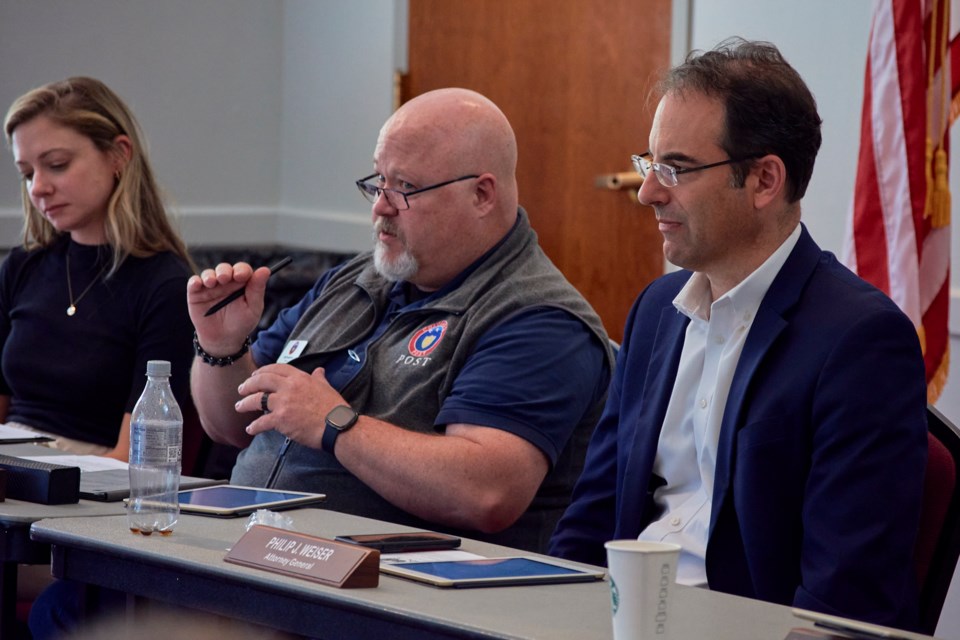NEWS RELEASE
OFFICE OF ATTORNEY GENERAL
*************************
Attorney General Phil Weiser today announced that the Colorado Department of Law has awarded $4 million in funding to address the opioid crisis throughout the state. Eight organizations received Opioid Abatement Innovation Challenge grants for their efforts in opioid use prevention, early intervention, appropriate harm reduction, treatment, recovery, and continuum of care, as well as behavioral health within the criminal justice or law enforcement setting.
“These grants focus on encouraging innovative ideas to address pressing needs in affected communities, and recipients underwent rigorous evaluations to ensure they met this objective,” said Weiser. “This investment goes beyond prevention and treatment; it's a commitment to hope, recovery, and the well-being of all Coloradans.”
The funding stems from lawsuits against drug manufacturers and distributors, resulting in $740 million in settlement funds to date. This initiative targets the 10% of opioid settlement funds allocated to the state and all funds must be used to abate the opioid crisis, as outlined in a joint opioid framework agreement between the state and local governments.
The Attorney General’s Office launched the application process in May 2023, receiving 66 applications totaling $44 million in funding requests by the June 30, 2023 deadline. A review committee evaluated the applications based on demonstrated need, program innovation, community collaboration, evaluation methods, and sustainability, emphasizing evidence-based practices to combat the opioid crisis.
The Opioid Abatement Innovation Challenge grants were awarded as follows:
- Boys and Girls Club in Colorado, $480,000 - Boys & Girls Clubs across Colorado will spend these funds on their prevention programming for hundreds of young people at eleven geographically diverse clubs, primarily during school breaks and after school hours. Funds will support delivering social experiences addressing risk and protective factors for kids and teens and launching the implementation of evidence-based prevention programming that will educate youth on the threats of opioid and fentanyl misuse.
- Colorado Department of Public Health and Environment, $430,000 - The Colorado Department of Public Health’s Office of HIV/STI/Viral Hepatitis was awarded funding for the Harm Reduction Accelerator Fund to fund two new rural programs and a related summit to promote evidence-based practices. Respectively, the projects aim to support the establishment of programming in rural Colorado and encourage collaboration between Colorado's existing harm reduction programs, especially as we see a rapid increase in misuse of fentanyl and emerging substances, such as the veterinary sedative xylazine across our state.
- Colorado Health Network, $400,000 - Western Colorado Health Network will integrate behavioral health treatment and care coordination services into a syringe access program in rural Colorado, providing connection to treatment, naloxone, behavioral health counseling, and other resources, fostering a network of trusted providers to empower people who use drugs toward successful treatment and long-term recovery. To ensure the sustained success of these initiatives, WCHN is also committed to revolutionizing staff support and well-being.
- Denver Health and Hospital Authority, $790,000 - The Colorado Opioid Model to Advance Treatment project will help Colorado counties and organizations expand opioid treatment and care coordination using a "hub and spoke" model to reduce substance use disorders across the state. Denver Health and the Northern Colorado Health Alliance will collaboratively build upon their existing and successful opioid hub and spoke models, which include correctional care and community care, to develop a toolkit and provide technical assistance, accessible for all 64 counties in Colorado.
- Larimer County Sheriff’s Office, $600,000 - The Stone Soup Community Reintegration Initiative is a unique program that tackles the opioid crisis at a systemic level, recognizing the underlying social inequities that contribute to crime and opioid use disorder. Through practices backed by data and research and honoring input from those with lived experience, the initiative targets policies, community support, organizational culture, intergenerational trauma, and individual needs related to the systems that lead to criminal behavior that cannot be adequately addressed through traditional efforts of individual organizations and programs. The initiative will provide outreach and technical assistance to other jails interested in developing similar programming.
- Rocky Mountain Crisis Partners, $400,000 - The grant funds will support the Rocky Mountain Crisis Partners' statewide Opioid Follow-up Program aimed at enhancing engagement in a tracked array of health care services for individuals with co-occurring mental health concerns and opioid use disorder. RMCP will strengthen connections to treatment and recovery services developed through its crisis hotline, particularly focusing on improved collaboration with substance use disorder providers across the state and behavioral health providers in Colorado's rural communities with the intention to reduce harm and enhance access to care to Coloradan’s facing these disorders.
- Serenity Recovery Connection, $500,000 - Serenity Recovery Connection and partners, Homeward Pikes Peak and Hazelbrook Community Center, will increase access to a wide array of recovery support services. Direct services will be offered through SRC’s Recovery Community Center and justice programs; HPP’s Harbor House, a men’s sober living and outpatient program; and HCC’s Transitional Safety Zone housing model that aids people transitioning from active drug use to supportive sober living.
- Tepeyac Community Health Center, $400,000 - Tepeyac, providing culturally responsive, integrated healthcare, will use grant funds to support the growth of the organization's substance use services. The organization will focus on treating opioid misuse through medication for opioid use disorder. Tepeyac seeks to increase screening for opioid use disorder and provide the overdose treatment drug naloxone to any community member in need, including people who use opioids, their family, friends, and community members.
*************************



